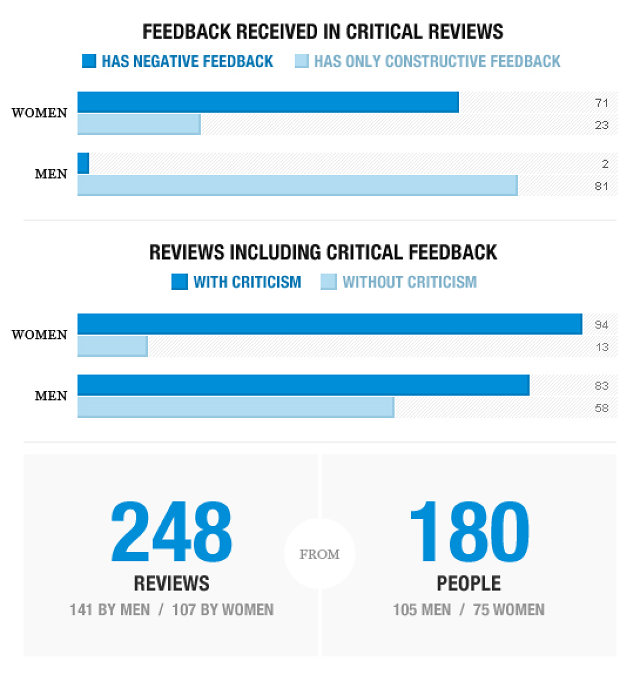------------------------------------------------------------------------
THE ONE WORD MEN NEVER SEE IN THEIR PERFORMANCE REVIEWS
THERE'S ONE ADJECTIVE THAT'S NEVER USED TO CRITICIZE MEN, YET IT SHOWS UP AT AN ALARMING RATE IN WOMEN'S PERFORMANCE REVIEWS.
It’s a scenario that could be straight out of a textbook on gender bias:
“Jessica is really talented, but I wish she’d be less abrasive. She comes on too strong.” Her male counterpart? “Steve is an easy case, smart and great to work with. He needs to learn to be a little more patient, but who doesn’t?”
These statements, uttered by an engineering manager who was preparing performance reviews, were the catalyst for linguist Kieran Snyder to see if she could quantify the double standards in the way male and female employees are evaluated.
In a report for Fortune.com, she collected 248 performance reviews from 28 companies from large technology corporations to small startups. The reviews came from 180 male and female managers.

Perhaps unsurprisingly critical feedback was doled out in a much higher ratio to women: 58.9% of men’s reviews contained critical feedback, while an overwhelming 87.9% of the reviews received by women did.
Not only did women receive more criticism in their performance reviews, it was less constructive and more personal. For example, the critical feedback men received was mostly geared toward suggestions to develop additional skills:
“There were a few cases where it would have been extremely helpful if you had gone deeper into the details to help move an area forward.”
Women received similar constructive feedback, but they also included the personality criticism such as “watch your tone” and “stop being so judgmental.” For example:
“You can come across as abrasive sometimes. I know you don’t mean to, but you need to pay attention to your tone.”
Abrasive alone was used 17 times to describe 13 different women, but the word never appeared in men’s reviews. In fact, this type of character critique that was absent from men’s reviews showed up in 71 of the 94 critical reviews received by women.
These findings, while from a small sample size, illustrate a well-documented phenomenon for working women: The Double Bind. The double bind is the idea that if a women is too “nice” at work or uses stereotypically feminine vocal characteristics she’ll be seen as too soft and won’t be taken seriously. On the flip side, if a woman is too assertive she’s seen as brusque and bitchy.
This paralyzing situation was rumored to be part of the reason why New York Timesexecutive editor Jill Abramson was abruptly fired earlier this year. Even if it wasn’t at the heart of her dismissal, the familiar critiques “abrasive” and “brusque” were often used to describe her management style, but not her male successor.
Unfortunately there isn’t an easy solution to this frustrating situation. Snyder found that even female managers critiqued women’s personalities and not men’s, hinting that these perceptions and biases are deeply and perhaps unconsciously engrained in the way we view women at work.
The first step is perhaps simply pausing and asking why abrasive is an adjective reserved for women.

No comments:
Post a Comment